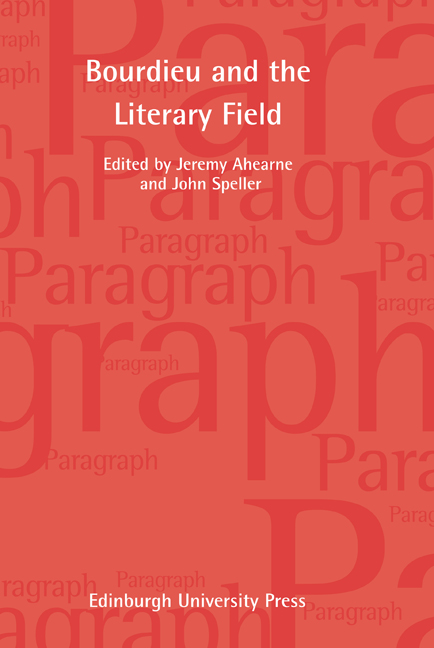Book contents
- Frontmatter
- Contents
- Introduction: Bourdieu and the Literary Field
- How Field Theory Can Contribute to Knowledge of World Literary Space
- Autonomy Revisited: The Question of Mediations and its Methodological Implications
- The Literary Field and the Field of Power: The Case of Modern China
- Between Repression and Anamnesis: Pierre Bourdieu and the Vicissitudes of Literary Form
- Reading and Reflexivity: Bourdieu’s Faulkner
- Fields and Fragments: Bourdieu, Pascal and the Teachings of Literature
- On an Enigmatic Text by Pierre Bourdieu
- Apollinaire, Autumn Ill
- Notes on Contributors
Autonomy Revisited: The Question of Mediations and its Methodological Implications
Published online by Cambridge University Press: 17 September 2020
- Frontmatter
- Contents
- Introduction: Bourdieu and the Literary Field
- How Field Theory Can Contribute to Knowledge of World Literary Space
- Autonomy Revisited: The Question of Mediations and its Methodological Implications
- The Literary Field and the Field of Power: The Case of Modern China
- Between Repression and Anamnesis: Pierre Bourdieu and the Vicissitudes of Literary Form
- Reading and Reflexivity: Bourdieu’s Faulkner
- Fields and Fragments: Bourdieu, Pascal and the Teachings of Literature
- On an Enigmatic Text by Pierre Bourdieu
- Apollinaire, Autumn Ill
- Notes on Contributors
Summary
Abstract:
Bourdieu's concept of the literary field aimed to overcome the opposition between internal and external analysis of literary works. This paper examines its theoretical and methodological implications by exploring the notion of mediations between text and context at three different levels: the material conditions of production and circulation of literary works; the modalities of their production by their authors; their critical reception. It is through these mediations that the key concept of autonomy becomes operational for empirical research and that it displays its heuristic power, as illustrated by works using Bourdieu's theory of the literary field produced over the last two decades.
Keywords: sociology of literature, literary field, autonomy, intellectual history, reception, censorship, Pierre Bourdieu
The question of the autonomy of cultural production is at once an ontological question and a methodological question, these two levels of enquiry being linked.From a methodological standpoint, studies of literary works and other kinds of cultural product can be divided between internal and external approaches. Internal analysis focuses on the act of deciphering rather than on the creative act. The hermeneutical method is based on textual analysis, leaving producers aside. Conversely, external analysis—sociological, historical, or biographical approaches—tends to reduce works to their material conditions of production and reception, ignoring the specificity of symbolic goods. Whereas internal analysis focuses on the structure of works, external analysis insists on their social function.
The question of autonomy was raised by Marxist approaches which replaced the mechanical notion of reflection with the idea of mediation. Lucien Goldmann considered autonomy at the level of works, while Raymond Williams located it at the level of the social conditions of production of literary works. Bourdieu conceptualized it and gave it a sociological application with the concept of field. Contrary to deterministic and mechanical approaches which reduce works and ideas to their material conditions, the concept of field allows us to account for the specificity of cultural or intellectual production and to study the field as a relatively autonomous space. This does not mean that socio-economic constraints do not have any impact on cultural activity, as has been assumed by the ideology of uncreated creators, but that this impact is indirect: it is refracted or mediated through the stakes, the logics of functioning and the structural principles that organize a particular cultural field.
- Type
- Chapter
- Information
- Bourdieu and the Literary FieldParagraph Volume 35, Number 1, pp. 30 - 48Publisher: Edinburgh University PressPrint publication year: 2020

